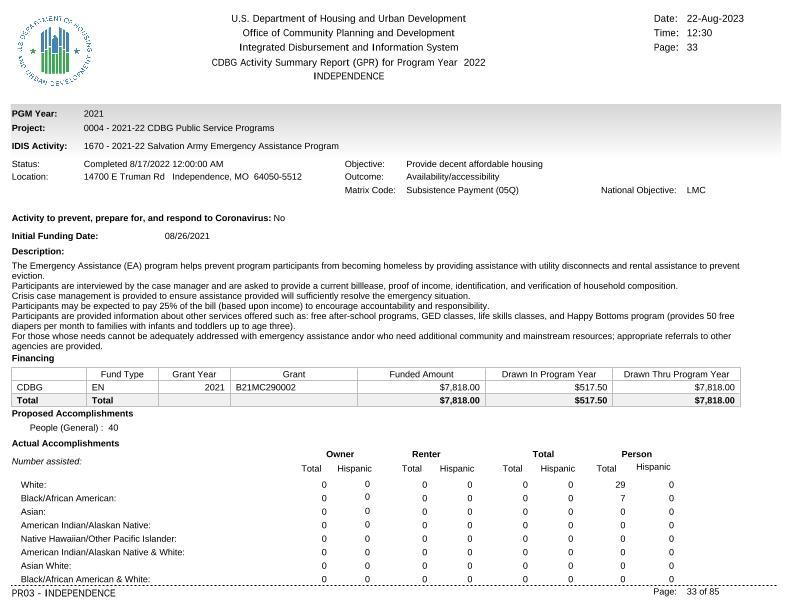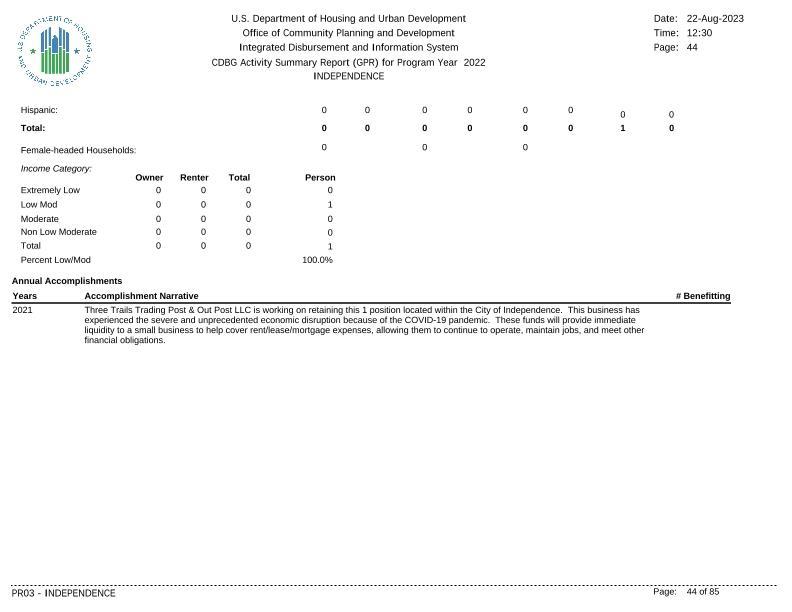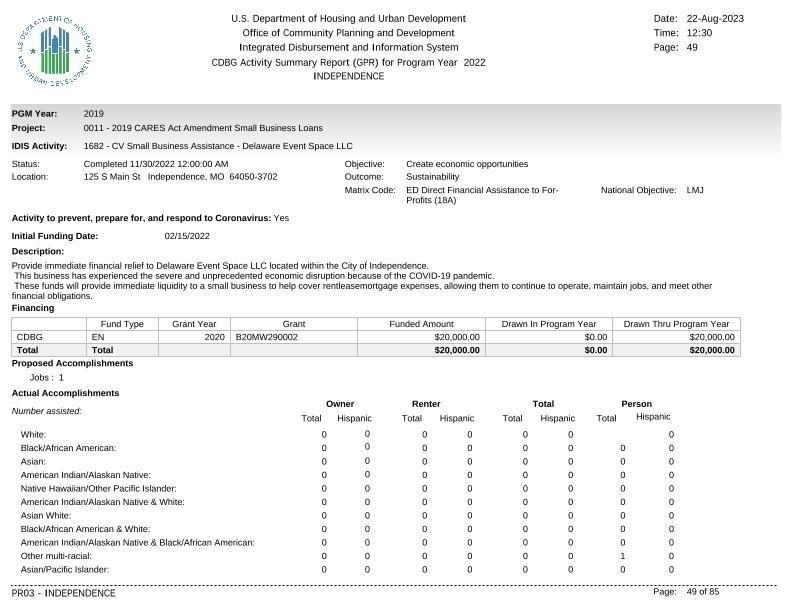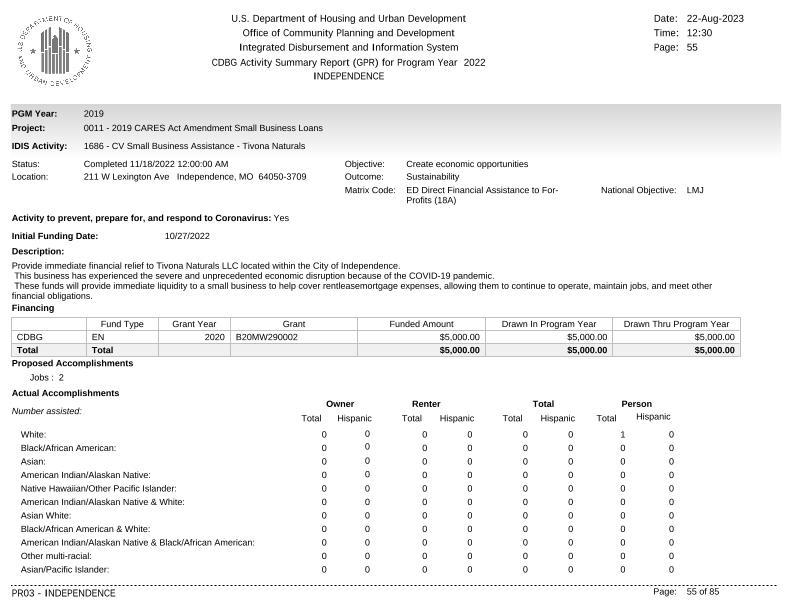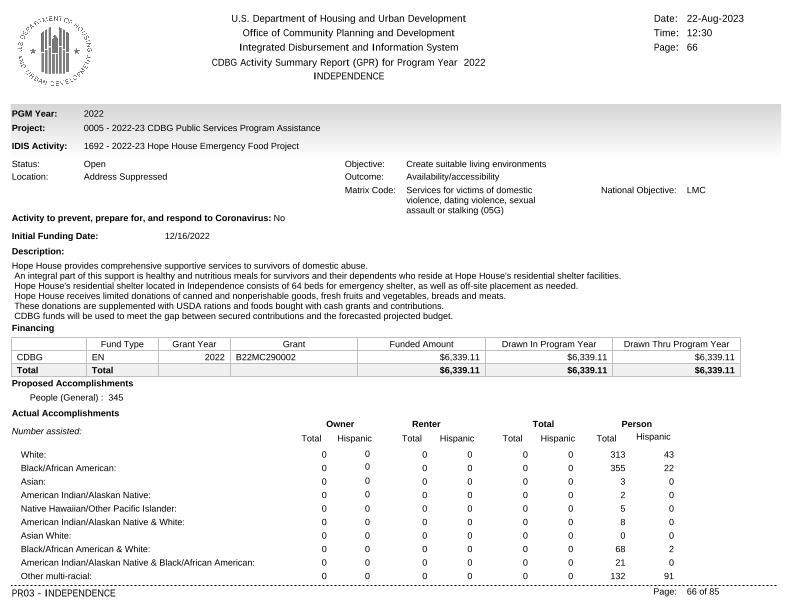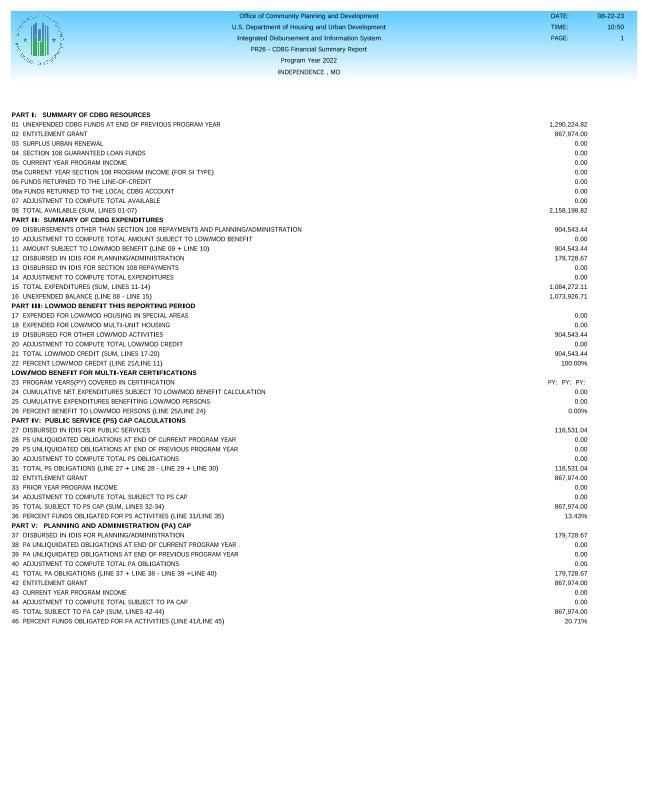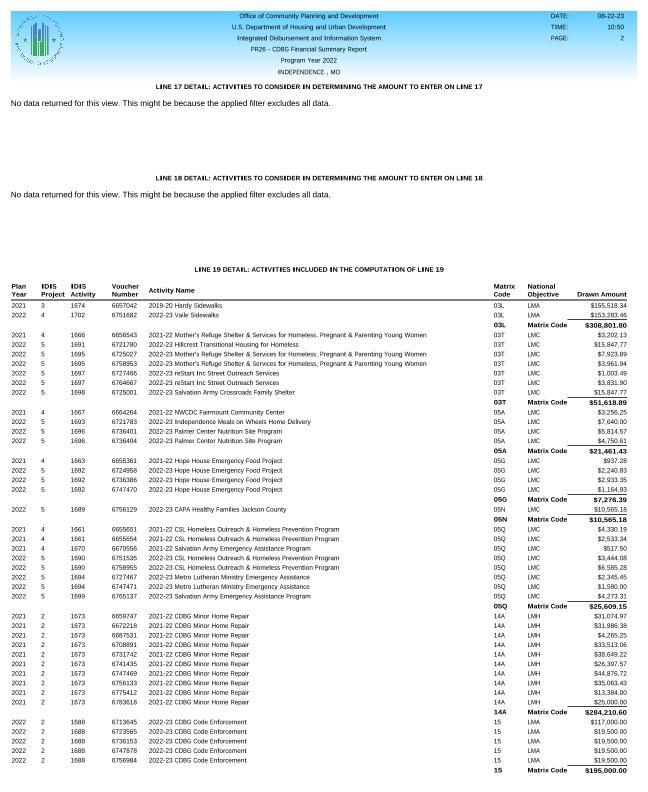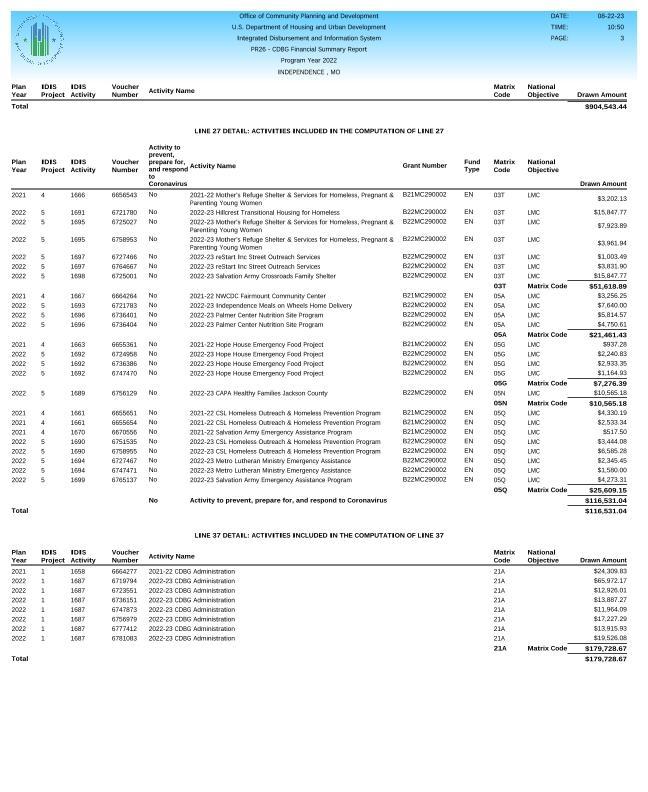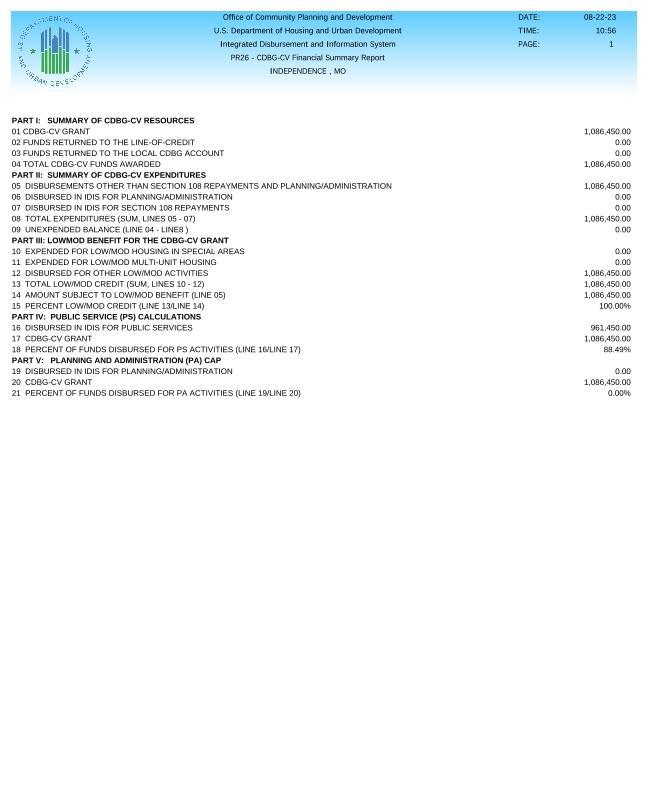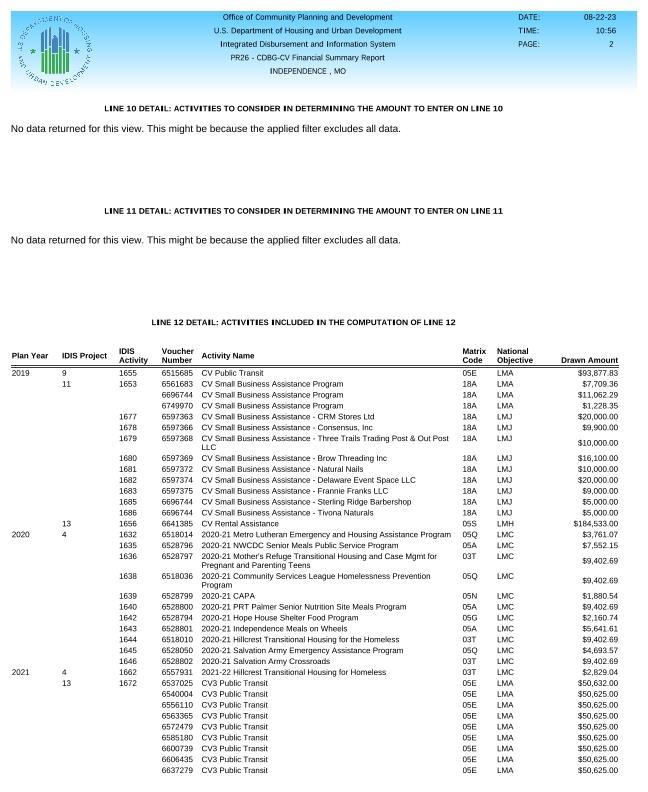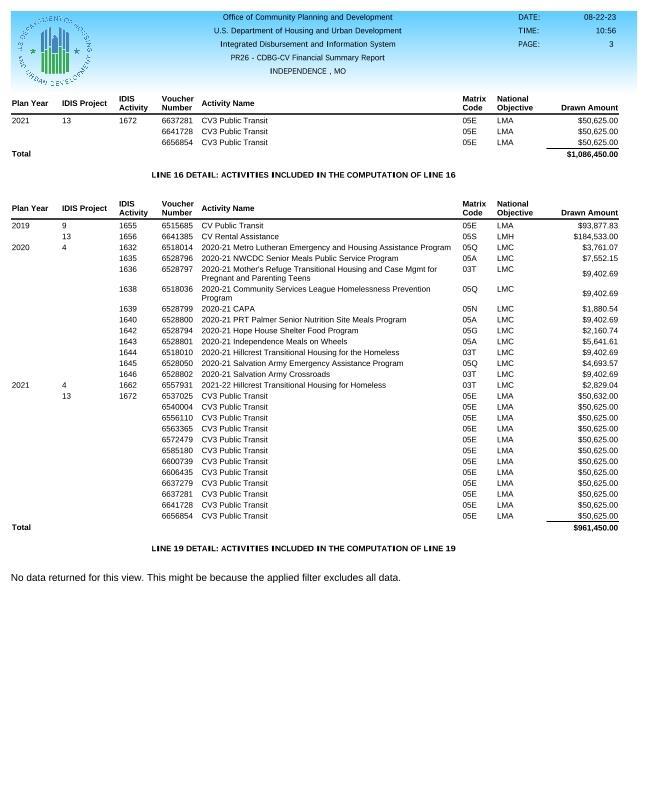Draft Consolidated Annual Performance and Evaluation Report (CAPER)
For CDBG & HOME Program Year 2022-23

Prepared by
September 5, 2023
Community Development Department City of Independence, MOCR-05 - Goals and Outcomes
Progress the jurisdiction has made in carrying out its strategic plan and its action plan. 91.520(a) This could be an overview that includes major initiatives and highlights that were proposed and executed throughout the program year.
This could be an overview that includes major initiatives and highlights that were proposed and executed throughout the program year.
The City’s Consolidated Annual Performance and Evaluation Report (CAPER) covers progress in carrying out the City’s Fiscal Year 2023 Annual Action Plan for the use of HUD’s Program Year 2023. The City is an entitlement city and is eligible to receive Community Development Block Grant (CDBG) and Home Investments Partnerships Grant (HOME) funds on an annual basis. This CAPER covers funding from the U.S. Department of Housing and Urban Development (HUD) used in the City’s fiscal year July 1, 2022 – June 30, 2023. Annual Action Plan (AAP) FY23 is the first AAP for the Five Year Consolidated Plan 2022-2026 (ConPlan). As required by HUD, the City has developed this CAPER using HUD’s template. The CAPER is available for public comment and then submitted each year to HUD for review. The purpose of the CAPER is to report on the use of these funds during the Program Year.
The City made progress towards its housing rehabilitation projects through its Minor Home Repair Program and the Community Infrastructure with the Valie Sidewalk project. This project will improve the existing facilities providing a safer travel route for pedestrians as well as improving mobility and accessibility to elderly, people/persons with disabilities and school aged children. Funded public service activities provided support to Abused and Neglected Children, provided Homeless Outreach & Homeless Prevention Program, provided transitional housing, case management, budget counseling, and assistance with life skills to reach selfsustainability, provided comprehensive supportive services to survivors of domestic abuse, provided Housing and Emergency Assistance Program, provided a shelter for homeless, pregnant, and parenting young ladies, between 12 and 21-years old, along with their babies, provided nutritionally balanced meals and human services to persons of low and moderate income who are elderly andor disabled, provided critical outreach, financial assistance and wraparound supports and resources to address issues causing homelessness, and transition clients into sustainable housing, provided operating costs for homeless family shelter, and provided assistance with utility disconnects and rental assistance to prevent eviction and potential homelessness.
OMB Control No: 2506-0117 (exp. 09/30/2021)
In addition, the City continued its code enforcement activities in low- to moderate-income neighborhoods to address blighting conditions.
Comparison of the proposed versus actual outcomes for each outcome measure submitted with the consolidated plan and explain, if applicable, why progress was not made toward meeting goals and objectives. 91.520(g) Categories, priority levels, funding sources and amounts, outcomes/objectives, goal outcome indicators, units of measure, targets, actual outcomes/outputs, and percentage completed for each of the grantee’s program year goals.
OMB Control No: 2506-0117 (exp. 09/30/2021)
Assess how the jurisdiction’s use of funds, particularly CDBG, addresses the priorities and specific objectives identified in the plan, giving special attention to the highest priority activities identified.
The 2022-23 Program Year was the first year of the 2022-26 Consolidated Plan. The City made progress across several goals outlined in that Plan. Some categories Actual Program Year accommplishments exceeded Expected Program Year. IDIS did not include the accomplishments for the code enforcement activity as well as development of new affordable homeowner housing units and single family homeowner rehabilitation
. As a result staff entered the accomplishments for those activities.
CDBG funds were used to address the priorities, needs, and goals identified in the Consolidated Plan. The proposed budget for the PY 2022-23 Annual Action Plan was adopted into the City Budget by the City Council.
Funding priorities for the 2022-23 CDBG and HOME Programs were determined by the results of various citizen participation efforts, the City’s Consolidated Plan, the adopted Comprehensive Plan, the Strategic Plan, the Capital Improvement Plan and the City-wide Housing Study. The City uses the CDBG Advisory committee to evaluate the competitive grant applications submitted by eligible Public Service sub-recipients and an internal evaluation committee for the HOME housing development/rehabilation. The funded activities support City Council priorities and those identified in the City's adopted Plans. In addition, HOME proposals were solicited to encourage universal design and aging in place, as a part of City’s Gold Standard Community for All Ages initiative through the Mid-America Regional Council (MARC).
OMB Control No: 2506-0117 (exp. 09/30/2021)
CR-10 - Racial and Ethnic composition of families assisted
Describe the families assisted (including the racial and ethnic status of families assisted).
91.520(a)
Narrative
During the 2022-23 Program Year, 16,743 households were served. Of these, 64% were white, and the second largest racial group of families assisted was Black/African American (approximately 25%). Data shown in the table above did not capture the racial categories: American Indian/Alaskan Native & White (22), Asian & White (1), Black/African American & White (477), American Indian/Alaskan Native & Black/African American (65), or Other Multi-Racial (898). Of those totals- they include the data from the 39 Total Households assisted.
The above table and paragraph includes data for the persons served through the City's Public Service Programs completed by CAPA, Community Services League, Hillcrest Transitional Housing, Hope House, Independence Meals on Wheels, Metro Lutheran Emergency Assistance, Mother’s Refuge, Palmer Center Nutrition Program, reStart Inc., Salvation Army Crossroads and Salvation Army Emergency Assistance.
The racial and ethnic composition of families assisted is similar to the overall demographics of the City of Independence as reflected in the most recent American Community Survey data from the US Census.
OMB Control No: 2506-0117 (exp. 09/30/2021)
CR-15 - Resources and Investments 91.520(a)
Identify the resources made available
Narrative
As with each program year, some CDBG non-public service projects run over the course of several program years, most notably the projects being managed by the City’s Municipal Services Department which includes a public facility and infrastructure projects which will be completed in FY 2023-24. For the HOME funding, the housing market, construction material cost, labor cost as well as the lingering supply chain issues slowed the expenditure of HOME funds. However, it is anticipated the 4 HOME projects will be completed and in the 2023-24 program year.
Identify the geographic distribution and location of investments
Narrative
As mentioned above, the funding priorities for the 2022-23 CDBG and HOME Programs were determined by the results of various citizen participation efforts, the City’s Consolidated Plan, the adopted Comprehensive Plan, the Strategic Plan, the Capital Improvement Plan and the City-wide Housing Study.
Public service projects selected for funding provided a direct benefit for low- to moderate-income clientele City-wide. These programs were targeted to all qualifying residents of Independence, whose household income falls below 80% of the median income, including the region's homeless. The redevelopment planning and program administration were distributed City-wide.
The public service activities and Program administration were basis for allocating 2022-23 CDBG and HOME Program investments within the boundaries of Independence, was determined primarily by the results (identification of needs and priorities) of the annual citizen participation process, and through committee evaluation of competitive grant applications submitted by eligible sub-recipients and thirdparty developers. Fifteen percent (15%) of CDBG funds (Public Services) and HOME funds (excluding the
OMB Control No: 2506-0117 (exp. 09/30/2021)
administrative funds) were awarded through a formal RFP Process. Funding decisions were be made based on basic project eligibility, applicant capacity, proposed benefit for the low and moderate-income community, and leveraging of other funding resources.
The City initiated activities including code enforcement and infrastructure improvements accounted for the remaining projects. While the City initiated activities to consider needs identified during the citizen participation process, they also reflect City Council priorities identified in the city's Comprehensive Plan, Strategic Plan Independence for All and Capital Improvement Plan processes. These activities were focused in CDBG-Eligible Census Tracts.
Code enforcement activies were conducted in deteriorating or deteriorated areas where such enforcement, together with public or private improvements, rehabilitation, or services to be provided, may be expected to arrest the decline of the area.
During the 2022-23 Plan period, city driven CDBG and HOME activities continued to focus on supplementing the community's larger redevelopment efforts, and the repair and replace of missing sidewalks in a low-moderate income neighborhood to improve accesss and mobility.
OMB Control No: 2506-0117 (exp. 09/30/2021)
Leveraging
Explain how federal funds leveraged additional resources (private, state and local funds), including a description of how matching requirements were satisfied, as well as how any publicly owned land or property located within the jurisdiction that were used to address the needs identified in the plan.
The City continues to identify match contributions for the HOME program. Thus far, match has been provided from projects meeting HUD’s criteria for affordable housing activities (with partial federal funding), including houses built or rehabilitated for sale to income-eligible buyers by Truman Heritage Habitat for Humanity and OIKOS Development for sale to income-eligible families. The HOME program match has been obtained primarily from the following sources: (1) cash from non-federal sources for eligible affordable housing projects, such as cash donations from project supporters or grants from state or local government funds; (2) forgone fees and charges for building permits, building permit plan reviews and demolition permits required for such eligible projects; (3) the appraised market value of real property donations for such eligible projects; and (4) the value of donated project design services, donated site preparation services, donated project construction materials and/or donated project labor for such eligible projects.
In addition, the sub-recipient Non-Profit agencies awarded CDBG Public Service dollars were required to document matching funds in the ratio of 5:1 of CDBG dollars contracted. All of the Non-Profit agencies exceeded the minimum matching requirement. The total amount of leveraged funds with the CDBG Public Service funding is over $10 million dollars, which is a 78:1 ratio.
Finally, the City leveraged general fund and other monies to supplement CDBG funding for code enforcement and public facilities/infrastructure in the amount of approximately $1,100,000. These activities address Community Code Enforcement and Blight Removal and Community Infrastructure priorities identified in the Consolidated Plan.
Fiscal Year Summary – HOME Match
1. Excess match from prior Federal fiscal year
OMB Control No: 2506-0117 (exp. 09/30/2021)
4,217,762
Fiscal Year Summary – HOME Match
HOME MBE/WBE report
Minority Business Enterprises and Women Business Enterprises – Indicate the number and dollar value of contracts for HOME projects completed during the reporting period
Minority Owners of Rental Property – Indicate the number of HOME assisted rental property owners and the total amount of HOME funds in these rental properties assisted
OMB Control No: 2506-0117 (exp. 09/30/2021)
Relocation and Real Property Acquisition – Indicate the number of persons displaced, the cost of relocation payments, the number of parcels acquired, and the cost of acquisition
OMB Control No: 2506-0117 (exp. 09/30/2021)
CR-20 - Affordable Housing 91.520(b)
Evaluation of the jurisdiction's progress in providing affordable housing, including the number and types of families served, the number of extremely low-income, low-income, moderate-income, and middle-income persons served.
Discuss the difference between goals and outcomes and problems encountered in meeting these goals.
The City exceeded the annual goals on both the HOME and CDBG side. The City’s CHDO’s were successful in completing their projects started during COVID-19 pandemic using funds from prior years. The CHDO’s completed two (2) rehabilitations of existing and blighted single family homes for single family homeownership opportunities and two (2) new construction of single family homes for homeownership opportunities.
On the CDBG side, the City’s Minor Home Repair program activity increased. The Program was able to successfully complete 23 minor home repairs for low- to moderate-income homeowners.
Discuss how these outcomes will impact future annual action plans.
There continues to be situations where projects will start in one grant year and end in another, so while the one year numbers may not reflect progress, over the course of a two-three year period these amounts should balance. The city will continue to utilize projections from the subrecipients when estimating assisted households. The City will continue to monitor the goals set forth in the Consolidated Plan and adjust moving forward as needed.
Include the number of extremely low-income, low-income, and moderate-income persons served by each activity where information on income by family size is required to determine the eligibility of the activity.
Narrative Information
CDBG funds were used for eligible minor home repair activities while HOME funds were used for the production of single family homes for LMI homeownership opportunities. Data from the Minor Home Repair program shows those homeowners who were assisted were in either the low- or extremely lowincome categories. On the single family home production (HOME funding source), two (2) households were in the extremely low-income category with two (2) households in the moderate-income category.
OMB Control No: 2506-0117 (exp. 09/30/2021)
CR-25 - Homeless and Other Special Needs 91.220(d, e); 91.320(d, e); 91.520(c)
Evaluate the jurisdiction’s progress in meeting its specific objectives for reducing and ending homelessness through:
Reaching out to homeless persons (especially unsheltered persons) and assessing their individual needs
The City of Independence continues to participate in the Greater Kansas City Continuum of Care.
Homeless service providers in Independence continue to participate in the organization.
The City implemented a new program in July 2022. The Alternative Response for Community Healthcare (ARCH) Program is a community response program that was initiated in late-July 2022. This experimental program is designed to explore placing Community Paramedics and Licensed Clinical Social Workers into the “margins” of 911 operations, responding to low-acuity community 911 requests alongside and sometimes in place of traditional First Responders.
The mission of the Independence Alternative Response for Community Health (ARCH) is for Licensed Clinical Social Workers to respond on 911 events to advocate for the needs of the individual, seeking incident resolution that both minimizes First Responder responsibility for low-acuity emergency events as well as reducing barriers to appropriate assistance for the individual within the 911 system.
The vision is to explore 911 response for opportunities where non-traditional emergency response resources can provide most-appropriate, person-centric solutions to both First Responders and community members in crisis situations. ARCH is, at its core, an advocacy program focusing on individuals to reduce immediate crises and prevent entry into further poverty and homelessness by facilitating first steps toward long-term stabilization. Reducing homelessness is a primary end goal for this program through the methodology of correctly and effectively assisting those individuals in dealing with the issues and problems in other parts of their lives that have helped to create a situation that has made homelessness, or the near-term possibility of it a reality for them.
The ARCH program was expanded in March 2023. During ARCH-2, 94% of the 911 calls dealt with quality of life, houselessness and mental health issues. ARCH program staff were able to spend on average over
OMB Control No: 2506-0117 (exp. 09/30/2021)
27 minutes per call and follow up with 95 individuals to ensure individuals were connected with the appropriate resources.
Addressing the emergency shelter and transitional housing needs of homeless persons
The following Public Services Programs focus on providing emergency shelter and transitional housing needs of homeless persons in the City of Independence:
restart ($12,678) Street Outreach Services provide critical outreach, financial assistance and wraparound supports and resources to address issues causing homelessness and transition clients into sustainable housing. It is an entry into reStart's continuum of care and provides people experiencing homelessness with food, shelter, hygiene kits, transportation and other necessities.
Salvation Army Crossroads ($13,546) serves as the only family emergency shelter in Eastern Jackson County, CDBG funding was used to assist with general operating cost. Crossroads remains at full capacity, with a turn away rate of 200+ per month.
Salvation Army Emergency Assistance Program ($11,546) helps program participants from becoming homeless by providing assistance with utility disconnects and rental assistance to prevent eviction.
Hope House ($5,000) provided comprehensive supportive services to survivors of domestic violence with meals, legal services, and case management while in shelter. Funds were used to meet the gap between secured contributions and the forecasted projected budget that feeds approximately 250 people annually.
Metro Lutheran Emergency Assistance ($8,000) aided those in danger of losing their homes in the form of rent or utility assistance, combined with case management, food pantry and employment counseling.
Community Services League ($13,546) Homeless Outreach and Prevention Program provides individuals and families with emergency relief for urgent and short-term needs (i.e., temporary housing, rent and utility assistance, food, clothing, medications) and assist in identifying long term housing solutions
OMB Control No: 2506-0117 (exp. 09/30/2021)
through coaching and case management.
In June 2023, the City Council passed a resolution for the common purpose for the cities of Independence, Lee's Summit, Blue Springs,Raytown and Grandview-collectively known as the Eastern Jackson County Shared Services Initiative (EJCSSI) to continue to work together in addressing the myriad issues stemming from and contributing to homelessness. As the discussion progressed with members of the EJCSSI, two priorities emerged focused on response-orientedservices/programming including (1) increasing emergency shelters and (2) public messaging
Helping low-income individuals and families avoid becoming homeless, especially extremely low-income individuals and families and those who are: likely to become homeless after being discharged from publicly funded institutions and systems of care (such as health care facilities, mental health facilities, foster care and other youth facilities, and corrections programs and institutions); and, receiving assistance from public or private agencies that address housing, health, social services, employment, education, or youth needs
Currently, the City does not have a program specifically designed to address this situation. The City participates in the Greater Kansas City Continuum of Care as the primary vehicle by which the City of Independence and its network of local service providers work to help homeless persons make the transition to permanent housing and independent living. In addition, the City provided funding to local non-profits Salvation Army Crossroads, Salvation Army Emergency Assistance Program, Hope House, Hillcrest Transitional Housing and Metro Lutheran Emergency Assistance to meet some of these needs.
Helping homeless persons (especially chronically homeless individuals and families, families with children, veterans and their families, and unaccompanied youth) make the transition to permanent housing and independent living, including shortening the period of time that individuals and families experience homelessness, facilitating access for homeless individuals and families to affordable housing units, and preventing individuals and families who were recently homeless from becoming homeless again
In March 2023, the Independence T.O.G.E.T.H.E.R. program started. Independence T.O.G.E.T.H.E.R. is a partnership between the City of Independence and Community Services League that focuses on two community issues – assisting residents who are experiencing homelessness or housing instability, and contributing to community beautification by reducing roadway litter. Through the program, participants will obtain employment as a crew member reducing litter in our community, and will receive coaching to help move towards permanent housing.
OMB Control No: 2506-0117 (exp. 09/30/2021)
T.O.G.E.T.H.E.R. stands for Together Opportunities Grow Everyone To Help Empower Resiliency. The program is funded through a $100,000 grant from the City of Independence’s allocation of federal American Rescue Plan dollars.
Employees will be paid $12/hour and will be paid daily at the end of their shifts. In addition, $3 per hour will be put in escrow towards a participant’s housing savings fund. After every 100 hours worked, employees can request $300 paid toward any housing expense. These might include daily/weekly/monthly motel rental, past due rent and utilities, deposits on new utility services or apartment rental, or any other expense that promotes permanent, stable housing.
Employees will also be provided with proper work attire and supplies, including high visibility safety vests. Breakfast and lunch will also be offered to employees.
CSL will work to connect employees with additional housing resources and programs, and attempt to place them in permanent jobs. They will also assist employees in securing the appropriate state- issued identification and documents needed to enter the workforce.
OMB Control No: 2506-0117 (exp. 09/30/2021)
CR-30 - Public Housing 91.220(h); 91.320(j)
Actions taken to address the needs of public housing
The Independence Housing Authority (IHA) of Independence, MO is dedicated to providing our community with quality affordable housing that is decent, well maintained, and free from drugs and violent crime. Primary to this is the sound management, maintenance, and preservation of its public housing inventory according to the highest standards of the housing industry while at the same time providing responsible and responsive assistance to those they serve.
IHA manages 528 public housing units and 1,647 Housing Choice Vouchers. IHA implemented a variety of strategies to address the shortage of affordable housing as reflected in the waiting list statistics. Core strategies include: maximizing affordable housing opportunities through continuous program improvements and management efficiencies; leveraging additional resources to replace public housing units and implement mixed-finance, mixed-income redevelopment; and generating new housing opportunities by applying for additional vouchers should they become available – including special purpose vouchers for targeted groups such as the elderly, disabled, veterans, homeless and foster youth
Actions taken to encourage public housing residents to become more involved in management and participate in homeownership
IHA continues the HUD Job Plus program to local public housing residents. This program provides onsite job search and resume assistance; multi-community agency support; local banking services and financial education including budgeting classes, and 1st Time home buyers workshops. In addition to, IHA host several events to encourage IHA residents to become more involved with the management of their facilities.
The Housing Authority attempts to utilize other local agencies that provide the service of Home Ownership, such as Habitat For Humanity. IHA makes available to interested households a Voucher-toHome Ownership Program for Housing Choice voucher holders to help offset costs of a mortgage with the voucher assistance.”
The HCV Homeownership program has expanded beyond just the City of Independence. We have added Blue Springs, Lees Summit and Raytown as additional cities allowed to use the voucher for Homeownership, as long as all requirements are met at the beginning.
Actions taken to provide assistance to troubled PHAs
OMB Control No: 2506-0117 (exp. 09/30/2021)
The PHA is not designated as troubled, so N/A
OMB Control No: 2506-0117 (exp. 09/30/2021)
CR-35 - Other Actions 91.220(j)-(k); 91.320(i)-(j)
Actions taken to remove or ameliorate the negative effects of public policies that serve as barriers to affordable housing such as land use controls, tax policies affecting land, zoning ordinances, building codes, fees and charges, growth limitations, and policies affecting the return on residential investment. 91.220 (j); 91.320 (i)
The City continues to meet and discuss updates to the Unified Development Ordinance (UDO) that centers around affordable housing and addressing blighting conditions. The City continues to work with the Englewood Neighborhood Association on a redevelopment plan centered around affordable housing, accessory dwelling units (ADUs) and easing of barriers to affordable housing such as neighborhood pocket cluster developments.
The City continues to administer the Southwest Independence Redevelopment Plan (SWIRP) and Tax Abatement Program. The Southwest Independence 353 Redevelopment Plan is designed to address residential blight and spur reinvestment in the Southwest Independence 353 Redevelopment Area by allowing tax abatements to owners of real property as an incentive to reinvest in and rehabilitate their properties in accordance with the Plan and Guidelines. The area covers several low- to moderateincome Census Tracts.
The City continues to offer the Building Permit Fee Waiver Program in low- to moderate-income Census Tracts. The City of Independence is committed to fostering redevelopment within distressed areas by encouraging the construction of new single-family residences and substantial rehabilitation of singlefamily residences. As such, the City approved Resolution No. 6815, Building Permit Fee Waiver Program, to incentize property owners. The Program seeks to:
• Attract infill and redevelopment investment in a distressed area
• Encourage projects that will help reduce neighborhood blight
• Stimulate and facilitate proper design through planned redevelopment
The Program waives the building permit fees (i.e., building fees, electrical, mechanical and plumbing fees) for new single family home construction and substantial rehabilitation of single-family residences within certain geographic boundaries.
Actions taken to address obstacles to meeting underserved needs. 91.220(k); 91.320(j)
The City derives strategies and priorities for housing and community development through the City’s Consolidated Plan, the City’s Comprehensive Plan, City-wide Housing Study, and the City’s Strategic Plan
OMB Control No: 2506-0117 (exp. 09/30/2021)
and aligning projects with those key outcome areas identified.
The primary obstacle to meeting all of the identified needs, including those identified as high priorities is the general lack of funding resources available to the public and private agencies who serve low and moderate income residents. The City, due to being an entitlement community, is not eligible for state CDBG or HOME programs.
In addition to providing direct financial assistance for unmet needs identified as priority during the consolidated planning process, the City continued to work toward building community capacity to overcome barriers through the following efforts.
Housing and Homelessness – The City continued to work with Truman Heritage Habitat for Humanity and Oikos Development Corporation on construction or rehab of single-family homes for sale to 50% and 80% of area medium income families, respectively. The City’s Minor Home Repair Program continues to assist low- to moderate-income homeowners with much needed home repairs to extend their longevity and to increase their safety and livability. Finally, the City continued its code enforcement efforts in deteriorating or deteriorated areas where such enforcement, together with public or private improvements, rehabilitation, or services to be provided, may be expected to arrest the decline of the area.
Homelessness – The City continues its efforts in meeting the underserved needs of the homeless population through annual financial support and participation in the Greater KC Continuum of Care. CDBG Public Service funds were allocated to the Salvation Army Crossroads Shelter, Community Services League (CSL) Hillcrest Transitional Housing, and Mother’s Refuge Transitional Housing to assist with staff cost. As mentioned in the CR-25 Section, the City implemented the Independence T.O.G.E.T.H.E.R. program, continued the ARCH program and started the Eastern Jackson County Shared Services Initiative (EJCSSI) to continue to work together in addressing the myriad issues stemming from and contributing to homelessness.
Economic Development – The City continued the administration of three (3) 353 development area plans and tax abatement programs. These programs are designed to address residential blight and spur reinvestment for owners of real property as an incentive to reinvest in and rehabilitate their properties in accordance with the Plan and Guidelines. The Independence Chamber of Commerce continues to assist the Ennovation Center with professional support and the provision of certain development incentives to promote new micro-business start-ups in Independence. The Ennovation Center is a dynamic business development incubator spanning over 28,000 square feet, featuring a range of
OMB Control No: 2506-0117 (exp. 09/30/2021)
specialized facilities and services to support the growth and success of its clients.
Supportive Services – The City provided CDBG funding through a competitive request for proposal process for a variety of public service activities intended to create or or expand services that target underserved needs in the community.
Actions taken to reduce lead-based paint hazards. 91.220(k); 91.320(j)
The Community Development Department follows the testing protocols and mitigation measures contained in HUD’s “Guidelines for the Evaluation and Control of Lead-Based Paint Hazards in Housing,” 2012 Ed. Among other provisions in the guidelines, HUD mandates that all housing projects assisted with CDBG & HOME funds be evaluated for the presence of lead-based paint hazards.
Oikos Development Corporation and Truman Heritage Habitat for Humanity, two CHDOs utilizing HOME funding for housing rehabilitation activities for the city, tests all homes for lead-based paint and follows proper protocols for controls and abatement. CDBG funded home repair programs conduct lead testing on any project with disturbed paint, and remediation must be included in the scope of work when found. The lead-based paint clearance report is filed with Department of Health and Senior Services with a copy to the City.
The City distributes Lead Hazard brochures to all federally assisted home buyer projects upon application.
The lead-based paint information is provided in the City’s Landlord Tenant Guide. It is mandatory for landlords to provide new tenants this guide.
Actions taken to reduce the number of poverty-level families. 91.220(k); 91.320(j)
Most activities undertaken by the City with CDBG and HOME funds are efforts to reduce persons in poverty and improve the quality of life for Independence residents, either directly or indirectly. The City continued to coordinate implementation of its existing affordable housing programs – HOME singlefamily housing development and/or rehabilitation, and minor home repair programs – with social service agencies involved in providing housing and supportive services to populations below the poverty line including low and very low-income populations. Due to COVID-19 the collaboration between agencies allowed for a continued development of wrap around services to help poverty-level families. CAPA, Community Services League, Hillcrest Transitional Housing, Hope House, Independence Meals on Wheels, Metro Lutheran Emergency Assistance, Mother's Refuge, NWCDC Senior Meal Program, Palmer Center Nutrition Program, Salvation Army Crossroads and Salvation Army Emergency Assistance Program provided much needed support to help reduce the number of poverty-level families.
OMB Control No: 2506-0117 (exp. 09/30/2021)
Projects that indirectly affect poverty include those that upgrade the community and provide safe, decent affordable housing. The Minor Home Repair Program assists low- to moderate-income households with health and safety housing issues. Without a CDBG-funded home repair, these homeowners would have been at risk of living in sub-standard conditions or of homelessness.
As mentioned in the CR-25 Section, the Independence T.O.G.E.T.H.E.R. program is seen as an early success in helping homeless and near homeless individuals.
Actions taken to develop institutional structure. 91.220(k); 91.320(j)
The City is to the goal of partnership with various agencies in the community regardless of their funding source in order to have the most effective impact that we can in the community. Throughout the program year staff met, consulted and partnered with corporate and non-governmental agencies and individuals to develop institutional structures to support the growing needs of the community. The City continues to cooperate with many public service agencies, neighborhood revitalization organizations and area housing providers who have a mutual interest in CDBG and HOME program goals.
The City, through the Mid-America Regional Council (MARC), works to support building a region that provides quality early education for all young children, a stronger workforce system, partnerships to increase the supply of affordable housing, and support for vulnerable families and older adults through nutrition incentives and Area Agency on Aging services.
The City continued to build partnerships with local builders and contractors to assist in residential in-fill housing and substantial rehabilitation of single family homes tagged unsafe to occupy or as a dangerous building. Through these partnerships and the City’s increased enforcement of blighting coniditions, the City has seen a significant increase in the number of residential homes being repaired.
Actions taken to enhance coordination between public and private housing and social service agencies. 91.220(k); 91.320(j)
The City’s Community Development Department is tasked with creating a more livable community. The City is focused on creating vibrant neighborhoods thru utilizing best practices in the planning and urban design in the redevelopment of the neighborhoods. The City, both in its planning and its execution of community development programs and activities, is continually working with other City departments,
OMB Control No: 2506-0117 (exp. 09/30/2021)
organizations, outside agencies and institutions to effectively carry out its mission. The City partners with the Independence Housing Authority, Truman Heritage Habitat for Humanity, OIKOS and other non-profits on affordable housing production and other issues during the program year.
The City of Independence staff participates in various committees focus on housing, transportation and other services affecting the LMI population.
• Community For All Ages is an age-friendly initiative that helps increase awareness in local jurisdictions of the impact of a growing older population. It provides workshops, resources and information to make our region more age-friendly. It offers a structured recognition program to help local jurisdictions shape policies, practices and infrastructure keeping all ages in mind, to ensure that older adults are understood, valued and involved in creating a high quality of life in their communities.
• Truman Heartland Community Foundation seeks to improve area Eastern Jackson County communities by promoting and serving private giving for public good
• First Suburbs Coalition – The committee seeks to identify and enhance the unique qualities of first suburb communities – neighborhoods where the majority of the housing stock was built post WWII to 1970 – to maintain a high quality of life for all current residents and future generations by promoting preservation, reinvestment and revitalization.
• Mobility Advisory Committee – This committee address issues regarding enhanced mobility for ADA and non-ADA paratransit services in the Kansas City region.
• Regional Transit Coordinating Council – This committee addresses regional transit planning, coordination and implementation of transit priorities.
• Sustain Places Policy Committee - The committee is composed of local elected officials, economic and community development interests, equity organizations, environmental and transportation experts, and persons experienced in private development. The Committee works with local communities to update and implement land-use strategies that support transportation, equity, environment and conservation principles.
• Greater Kansas City Continium of Care is the lead agency for Jackson County, Missouri and is responsible for Developing a community-wide process for coordination amongst relevant stakeholders.
• Southwest Independence Redevelopment Corporation that oversees the Southwest Independence Redevelopment Plan to ensure and promote revitalization throughout the area.
These partnerships have assisted the City to investigate ways to more effectively deliver and coordinate services to low and moderate-income areas
OMB Control No: 2506-0117 (exp. 09/30/2021)
Identify actions taken to overcome the effects of any impediments identified in the jurisdictions analysis of impediments to fair housing choice. 91.520(a)
Impediments to Fair Housing Choice are defined by HUD as any actions, omissions, or decisions which have the effect of restricting housing choice or the availability of housing choice on the basis of race, color, religion, sex, disability, familial status or national origin.
The City is in the first year of the 2022 Affirmatively Furthering Fair Housing (AFFH) Plan. This plan focuses considerable attention on understanding the situation for those living in areas of concentrated poverty and persons of color (Racially and Ethnically Concentrated Areas of Poverty R/ECAPS). The analysis looks extensively at steps to increase access to opportunity through education, transportation, jobs and environmental conditions.
The City amended the Unified Development Ordinance (UDO) related to homeless shelters. The purpose of this amendment was to help mitigate the development of homeless camps (that placed a strain on City resources) and provide the possibility of consistent resources to those who may need it the most.
The City staff continues to participate in the City’s Human Relations Commission, which was created to foster mutual understanding and respect among all ethnic, racial and religious groups, to discourage and prevent discrimination against any such group, or discrimination due to gender, age, handicap, or familial status and cooperate with federal, state and municipal agencies and non-governmental organizations with the purpose of effectuating its aims. The Commission met eight (8) times over the year and discussed topics ranging from disability awareness, houseless community, to the use of translation services.
City staff continued to use the landlord/tenant regulations, the Rental Ready Program and Vacant Structure Registration Program to address effects of impediments.. As part of the Rental Ready Program, all rental units are required to pass a basic health and safety inspection every two (2) years. The landlord will be required to hire a qualified housing inspector from the City’s approved list. The qualified housing inspector will inspect each units for the nine (9) basic health and safety items. If a unit fails an inspection, the landlord will be required to resolve any deficiencies and have the unit reinspected. No unit can be rented without an approved inspection form. As part of the program, the landlord is required to provide to the tenant a copy of the landlord/tenant guide, which includes a summary of
OMB Control No: 2506-0117 (exp. 09/30/2021)
applicable laws, federal and state regulations, Fair Housing Laws, EPA Lead Paint Guide and Lead Paint Disclosure
OMB Control No: 2506-0117 (exp. 09/30/2021)
CR-40 - Monitoring 91.220 and 91.230
Describe the standards and procedures used to monitor activities carried out in furtherance of the plan and used to ensure long-term compliance with requirements of the programs involved, including minority business outreach and the comprehensive planning requirements
The City of Independence monitoring of grant activities was aimed at achieving the following:
• Ensuring that grant funded activities strive to comply with federal and community regulations governing administrative, financial, and programmatic operations;
• Ensuring that, to the extent feasible, performance objectives are met within budget and on schedule; and,
• Identifying the need, if any, for providing or obtaining technical assistance
During the 2022-23 fiscal year existing systems, standards and procedures were utilized to monitor those areas of program administration and regulatory compliance identified as integral to meeting the goals of the Consolidated Plan and program objectives, including minority business outreach and comprehensive planning requirements. Generally, these areas include: 1) program performance review, which comprises national objectives, eligible activities, contract objectives, scope of work, contract schedule, and contract budget; 2) financial management practices, which comprises the accounting system and internal controls; 3) record keeping and reporting practices; 4) general management practices; and 5) non-discrimination compliance. (Refer to the current Annual Action Plan for a detailed explanation of the City’s Monitoring Policy.)
The City of Independence monitors sub-recipients by desk monitoring or on-site monitoring on the following basis:
• New sub-recipients (or those that have high staff turn-over OR not been funded in the prior 2-3 years) will receive an on-site monitoring visit.
• Any sub-recipient who failed to report timely or had difficulty reporting accurately in the prior year will receive an on-site monitoring visit.
• Any sub-recipient that has been consistently funded without reporting delays or errors will be desk monitored or on-site monitored on an every other year basis.
OMB Control No: 2506-0117 (exp. 09/30/2021)
The above items are determined based on the agency, not the program. (i.e. : if an agency is funded for something with a different scope of work, it is still considered consistent funding as the same client intake is generally required).
Citizen Participation Plan 91.105(d); 91.115(d)
Describe the efforts to provide citizens with reasonable notice and an opportunity to comment on performance reports
In accordance with the City of Independence Citizen Participation Plan, a notice of the availability for review and comment of its annual Consolidated Annual Performance Evaluation Report (CAPER) was published utilizing an ad in the locally circulated Independence Examiner and by posting on the City of Independence Community Development Web page and at public libraries and community centers. This notice included information on how to obtain a copy of the draft CAPER via the Web, in person, or by telephone request, and provided information necessary for anyone needing to request a special accommodation to participate in this process. The CAPER was available for public comment in different languages.
The public comment period for the 2022-23 CAPER will begin September 6, 2023, with a legal advertisement in the Independence Examiner and will be concluded September 24, 2023. The public will be encouraged to give comments regarding the CDBG program as a whole and the CAPER for 2022-23. All proposed actions under the Entitlement Program were reviewed for compliance under HUD regulations, specifically that they meet a national objective, constitute an eligible activity, and address one of the goals established by the City within its Consolidated Plan.
OMB Control No: 2506-0117 (exp. 09/30/2021)
CR-45 - CDBG 91.520(c)
Specify the nature of, and reasons for, any changes in the jurisdiction’s program objectives and indications of how the jurisdiction would change its programs as a result of its experiences.
The City of Independence has not changed its goals and/or its objectives and has had no significant negative experiences affecting its CDBG program to date.
The City of Independence's City Council's reaffirmation of "Independence for All" Strategic Plan Update, and "Independence 2040: Community For All Ages" Plan will move the City's Annual Action Plan goals toward common goals with measurable impacts. The Strategic Plan has four primary goals:
• Improve customer service and communication - improve customer service; communicate more effectively internally and externally
• Ensure City finances are stable and sustainable - control long term costs; optimize resources; improve long-range financial planning and decision-making
• Increase economic prosperity of the community - attract and retain quality employers; grow retail and commercial business
Achieve livability, choice, access, health and safety through a quality-built environment – reduce blight; improve visual appearance; improve public infrastructure and facilities; reduce crime and disorder; increase perception of safety; stabilize and revitalize neighborhoods; build new housing units.
Does this Jurisdiction have any open Brownfields Economic Development Initiative (BEDI) grants?
No
[BEDI grantees] Describe accomplishments and program outcomes during the last year.
OMB Control No: 2506-0117 (exp. 09/30/2021)
CR-50 - HOME 24 CFR 91.520(d)
Include the results of on-site inspections of affordable rental housing assisted under the program to determine compliance with housing codes and other applicable regulations
Please list those projects that should have been inspected on-site this program year based upon the schedule in 24 CFR §92.504(d). Indicate which of these were inspected and a summary of issues that were detected during the inspection. For those that were not inspected, please indicate the reason and how you will remedy the situation.
The City did not use HOME funds to fund rental housing project during the 2022-23 Program Year and has one (1) HOME–funded rental housing project (Mt. Washington Senior Apartments to monitor.
In accordance with HOME Program requirements on-site inspections were conducted during the 202223 program year for the following HOME assisted rental projects:
• Mt. Washington Senior Apartments (6 units) - utilizing an agreement created during development with MHDC, City staff reviewed inspection summary reports including income certification and verification, household size and eligibility, annual recertification requirements, provided by Sherman Associates. No material deficeincies were noted.
Provide an assessment of the jurisdiction's affirmative marketing actions for HOME units. 24 CFR 91.520(e) and 24 CFR 92.351(a)
The City is committed to affirmatively furthering fair housing by promoting fair and equal housing opportunities for individuals living in the City of Independence. This commitment extends to all housing programs managed by the City and to all HUD grant-funded programs provided by the City. It is the policy of the City to provide services without regard to race, color, religion, national origin, ancestry, age, gender, familiar status or physical/mental disability.
The 2022-23 Plan year projects and initiatives adhere to the City-required HOME Program affirmative marketing efforts aimed at soliciting persons who may not likely apply for housing without special outreach, particularly those persons with limited English proficiency, including:
• Developer and subrecipient adoption of affirmative marketing plans that comply with 24 CFR Part 92.351 for projects.
• As appropriate and necessary, utilization of newspaper publications, the City website, City-wide utility billing inserts, church and neighborhood newsletters, school district student/parent handouts, community center events and nonprofit organization efforts,particularly those that serve underrepresented groups, to disseminate information about participation in HOMEassisted, Low Income Housing Tax Credit, and other types of affordable housing opportunities.
• Circulating flyers and direct referrals to applicable homeless and affordable housing advocacy
OMB Control No: 2506-0117 (exp. 09/30/2021)
groups, and other organizations as identified by the City, which serve groups that may need special assistance to apply for housing.
Refer to IDIS reports to describe the amount and use of program income for projects, including the number of projects and owner and tenant characteristics
The PR-09 Report shows $849.50 of Program Income by Voucher # 5402549 was received during 202223. As noted in the Voucher, this program income was received in 2020, allocated via the 2021-22 Amended Annual Action Plan. This funding was awarded to a CHOD during our HOME RFP allocation process and will be used on a single family rehabilitation for homeownership opportunity that is currently in the construction phase. There have been no draws associated with with this single family rehab project.
In addition, a CHDO utilized $9,534.05 of prior year Program Income on the construction of a new single family home for homeownership opportunity to a household with income less than 30% AMI.
HOME Projects and Funding – As previously mention, the housing market, construction material cost, labor cost as well as the lingering supply chain issues slowed the expenditure of HOME funds. However, the City continues to see progress on HOME projects. A total of four (4) single family homeownership projects were completed while four (4) single family homeownership projects were ongoing during 2022-23. Of the four (4) completed projects, two (2) were acquisition and rehabilitation projects, which were sold to households with income between 60-80% AMI, and two (2) were new construction projects, which were sold to households with income less than 30% AMI. It’s anticipated that the four (4) ongoing projects will be completed in 2023-24 program year and the single family homeownership projects awarded 2022-23 HOME funds will begin.
HOME ADMIN – The City expended $44,541.91 in HOME for HOME grant administration, which totaled 8.2% of the HOME entitlement funds, below the 10% maximum.
HOME CHDO – The City expended $44,354.24 of Community Housing Development Organization (CHDO) Operating funds to two (2) different CHDOs operating within the City. These CHDO Operating funds were from 2020-21 and 2021-22 Program Years.
Describe other actions taken to foster and maintain affordable housing. 24 CFR 91.220(k) (STATES ONLY: Including the coordination of LIHTC with the development of affordable housing). 24 CFR 91.320(j)
In recent years, the City housing market has experienced spiraling land values that together with the relatively lower income levels of the City’s population (compared to neighboring areas) contribute to the primary barrier to affordable housing - the disparity between the cost of housing in the area and the lack of economic resources to access that housing. Although the City has an aging housing stock, the low incomes of residents (mainly in the older portion of the community) present challenging barriers to
OMB Control No: 2506-0117 (exp. 09/30/2021)
housing affordability.
Local development standards are regularly reviewed and updated to ensure that standards do not have unintended negative consequences. Local development standards are designed to increase the opportunities and feasibility of developing new and improving the conditions of existing affordable housing.
The strategy of the City is to continue its ongoing efforts to review potential barriers to affordable housing that are within the City’s power to address; to continue to pursue and utilize available funding for job creation, down payment assistance and housing rehabilitation; and to continue to work with and partner with CHDOs and housing developers from the non-profit and for-profit sectors to promote the quality housing standards in Independence.
The City utilized HOME funds for activities that include acquisition and rehabilitation of affordable, existing homes for homeownership and providing direct financial down payment assistance to low-mod income homebuyers. HOME funding is restricted to households with incomes below 80% AMI.
The City continued to work with Truman Heritage Habitat for Humanity and Oikos Development Corporation on construction or rehab of single-family homes for sale to 50% and 80% of area medium income families, respectively. The City’s Minor Home Repair Program continues to assist low- to moderate-income homeowners with much needed home repairs to extend their longevity and to increase the safety and livability of their homes. Finally, the City continued its code enforcement efforts in deteriorating or deteriorated areas where such enforcement, together with public or private improvements, rehabilitation, or services to be provided, may be expected to arrest the decline of the area.
OMB Control No: 2506-0117 (exp. 09/30/2021)
CR-58 – Section 3
Identify the number of individuals assisted and the types of assistance provided
OMB Control No: 2506-0117 (exp. 09/30/2021)
Table 15 – Qualitative Efforts - Number of Activities by Program
Narrative
The City had one (1) activity requiring compliance with the Section 3 requirements. The Vaile sidewalk project involved the repair and replacement of ADA-compliant sidewalks and curb ramps along the roadways surrounding the historic Vaile Mansion property at 1500 North Liberty Street. The purposed of the project will improve the existing facilities providing a safer travel route for pedestrians to improve mobility and accessibility to elderly, people/persons of disability and school aged children. The contractor exceeded both the total Section 3 Worker hours and the Targeted Section 3 Worker hours.
































